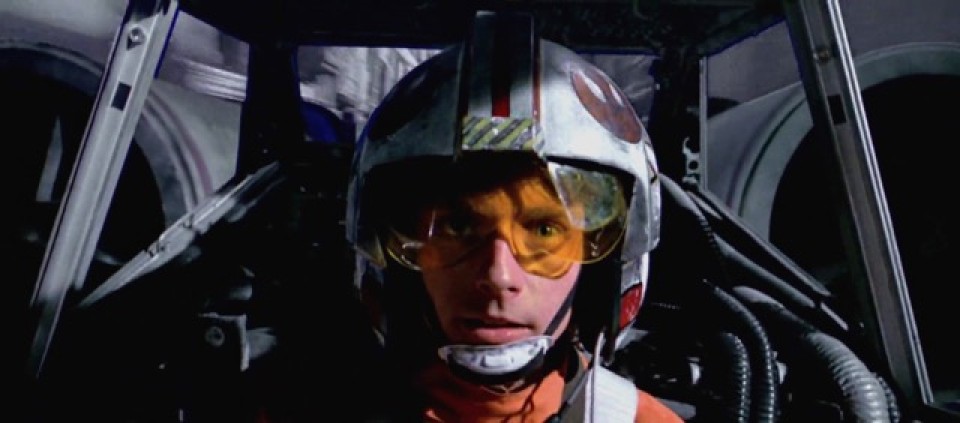The Wisdom of 'Star Wars' for the Age of Technology

I am looking out the front window of my house and I see a young man, maybe 14, walking down our road. His neck is jutting forward and his head is looking down at a phone he is holding in his hand. (I cringe to think about the condition of his cervical spine in a few years if this practice keeps up!) He does not see the trees being blown by the wind. He does not hear the crow cawing overhead. He is not really here, and he is not alone in his absence—a whole generation is “not here” with him.
And the phone is just the beginning; I wonder in what ways the new virtual reality consoles will change society in the years to come. I worry about people being drawn into alternate virtual worlds in order to escape the day-to-day banality of life in analog. If we don’t know this world deeply, how will we care for it?
I can’t help but think back to my own experience of being 14 and walking down a road. I can recall always looking up and around, into the forest, around the neighborhood. With no phone, the world was my stimulation. Yes, it was boring at times, and sure, I might have longed for a TV in the palm of my hand, if I had thought of such a thing. But, without it, my senses moved outward and I found solace in the richness of the world around me and within me. There is no true adventure, no depth, no reward in being a walking screen zombie. If only this teenager would put the phone away and look around at the living world of the senses in which he lives.
Watching him reminds me of a scene in the original Star Wars film, A New Hope—a moment of cinematic genius that was years ahead of its time. You probably remember it, too: Luke Skywalker is flying down a trench in the Death Star, attempting to blow up the entire battle station with one fateful shot from his X-Wing fighter. While he is getting into position, Luke is looking down the trench through a targeting computer that shows him the view outside his cockpit. Another pilot had used this same technology to take the same shot, and had missed the mark. Luke can’t afford to miss this time.
While he is setting the instrument, Luke hears the voice of his mentor, Obi-Wan Kenobi, a powerful Jedi Knight who now speaks to Luke from the great beyond.
“Use the Force, Luke.”
Luke hears the voice but thinks it is just in his head, and keeps looking at the screen.
“Let go,” says Obi-Wan. Luke looks puzzled and torn.
“Luke, trust me,” says Obi-Wan, to seal the deal. And Luke does; he turns off his computer and the screen retracts back into its console. The ground crew is concerned. “Luke, you turned off your computer, is something wrong?”
Luke is now flying on instinct. He takes a deep breath, and seems to become both relaxed and intensely focused. When his moment comes, he takes the shot—and a few beats later, the Death Star is no more.
A New Hope was released in 1977. I was one year old. Cars were still being made with eight tracks and the personal computer was still a few years away, but George Lucas saw how technology was quickly making its way into our lives. In creating Star Wars, he sought to fashion a modern mythology—based on the work of Joseph Campbell, the historian and scholar of mythology—that would address the unique challenges of our age and, in particular, the challenges of technology. It’s interesting to consider the character of Darth Vader in this context—a being who, in the words of Obi-Wan, is “more machine now than man, twisted and evil.”
Lucas saw this world coming, a world in which computers, droids, and advanced biomedical technologies would blur the lines between human and machine. And yet, he also infused his tale with contemplative and mystical Jedi Knights, a powerful Force that generates life, and an eternal struggle between darkness and light. And, in doing so, he showed us the way beyond a soulless world of machines and the devastation of nature. He gave us young Luke, with the faith and the courage to trust in himself, turn off his computer, and take his shot.
Although our mission in life may not be as dramatic as Luke’s, we all have the power to overcome darkness and make the world kinder and better. But, in order to do that, we need to put the phone away, look up, use our instincts, and tap into what each moment is calling for. If enough of us can do that, the effect will be enormous.
May the Force be with you!
Still from Star Wars: A New Hope. Credit: Lucasfilm Ltd. | The Walt Disney Company. Source: starwars.com
Micah Mortali is lead Kripalu faculty, the Founder of the Kripalu School of Mindful Outdoor Leadership and author of Rewilding.
Full Bio and Programs